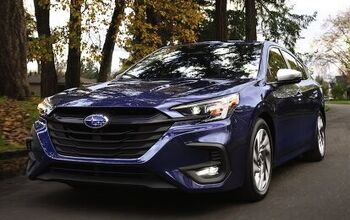Despite Falsified Supplier Data, Japanese Automakers Claim Cars Are Safe

Kobe Steel, the disgraced Japanese metal supplier, apparently falsified quality data for its products for over 10 years, the company now admits. Some of those products were sheetmetal and aluminum components used by a slew of automakers, among them American, Japanese, French, German, and Swedish manufacturers.
Makers of trains and airliners also made use of the metals, the strength and durability of which is now in doubt. This week, the European Aviation Safety Agency warned against components made by Kobe Steel.
While Boeing and Airbus inspect their aircraft, automakers are doing the same. Ford has said there’s no reason to be concerned, as Kobe product only went into the hood of a Chinese-market sedan. Now, four other automakers have given their vehicles a clean bill of health.
According to Reuters, Toyota, Honda, Nissan, and Mazda — four of the five Japanese automakers to use Kobe parts in hoods and other exterior components — says tests show the parts are safe. Mitsubishi hasn’t yet issued an all-safe message.
In a statement, Toyota said, “We confirmed that the materials satisfy applicable statutory standards, and our own internal standard, for key safety and durability requirements for vehicles.”
Other automakers impacted by the scandal include General Motors, Mercedes-Benz, Tesla, Volvo, and Hyundai. While Japanese automaker seem okay with what Kobe shipped to their factories, the industry as a whole wonders how it can trust the supplier. In total, 500 companies use Kobe components and materials.
“For a manufacturer, quality control is the most important thing and they were cheating for many years,” one senior industry executive told Reuters. “This was a shock to their customers, who can no longer trust Kobe Steel.”
Kobe’s CEO claims he wants to make right with the industry, starting with discovering how the culture of falsifying quality reports began and spread. Once that’s wrapped up, and all parts identified and inspected, Hiroya Kawasaki says he will resign. Meanwhile, the supplier is bracing for lawsuits even as the company’s stock takes a Volkswagen-like nosedive.
[Image: Toyota]

More by Steph Willems
Latest Car Reviews
Read moreLatest Product Reviews
Read moreRecent Comments
- Jkross22 I'd imagine there's a booming business available for EV station repair.
- JLGOLDEN Enormous competition is working against any brand in the fight for "luxury" validation. It gets murky for Cadillac's image when Chevy, Buick, and GMC models keep moving up the luxury features (and price) scale. I think Cadillac needs more consistency with square, crisp designs...even at the expense of aerodynamics and optimized efficiency. Reintroduce names such as DeVille, Seville, El Dorado if you want to create a stir.
- ClipTheApex I don't understand all of the negativity from folks on this forum regarding Europeans. Having visited the EU multiple times across different countries, I find they are very much like us in North America-- not as different as politicians like to present them. They all aren't liberal "weenies." They are very much like you and me. Unless you've travelled there and engaged with them, it's easy to digest and repeat what we hear. I wish more Americans would travel abroad. When they return, they will have a different view of America. We are not as perfect or special as we like to believe. And no, many Europeans don't look up to America. Quite the opposite, actually.
- Dwford Let's face it, Cadillac is planning minimal investment in the current ICE products. Their plan is to muddle through until the transition to full EV is complete. The best you are going to get is one more generation of ICE vehicles built on the existing platforms. What should Cadillac do going forward? No more vehicles under $50k. No more compact vehicles. Rely on Buick for that. Many people here mention Genesis. Genesis doesn't sell a small sedan, and they don't sell a small crossover. They sell midsize and above. So should Cadillac.
- EBFlex Sorry BP. They aren’t any gaps


































Comments
Join the conversation
The real problem will be when these cars get into a wreck, some lawyer is going to find some expert and they will then sue everyone with the slightest connection.
Yup, no doubt about it, hoods and trunklids are dangerous when made of Kobe aluminum. And none of the companies buying affected metals have an incoming inspection program or process controls any more. That's so '90s. Of course, there's the matter of making airliner wings out of the out-of-spec stuff. Again, it strains my credulity that companies routinely accept materials with no internal quality assurance inspections. Nissan is supposed to train inspectors for two months to fill in forms that certify a car meets Type Specifications, like having four wheels. They cheated by using inspectors with only 6 weeks training. Mitsubishi Motors is the real bad guy. A scandal in 2001, another one in 2011 on fuel economy falsifications, whereupon much ritual bowing assured authorities it wouldn't happen again. Until 2016, when they were at it again. Still, look on the bright side - now Nissan has semi-bought them out, they can have a fresh look at their own inspection program. Nissan is shutting down for two weeks in Japan on home-market cars while inspectors are trained. Apparently they're getting on-the-job training certifying export cars in the meantime, reading between the lines. https://dailykanban.com/2017/10/nissan-brouhaha-premature-inspectors-cause-shutdown/